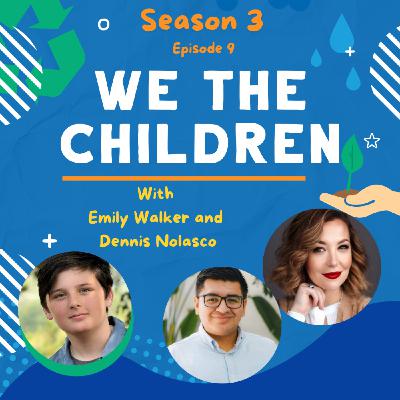
We The Children - Kids Talk Climate Solutions
Author: We The Children - Kids Talk Climate Solutions
Subscribed: 14Played: 104Description
Hi! My name’s Zachary Fox-Devol. You can just call me Zach. I might only be 13 years old, but I already have a lot of questions about the environment, how climate change will impact my generation and, most importantly, what we can do to help.
That’s why I started this podcast. We the Children is a place for kids like me to learn more about the climate crisis, and the environment, but have some fun along the way, too. On the show, we’ll explore things like climate change, climate action, severe weather and sustainable living, through conversations with experts, educators, and climate activists. I think that kids like me (and maybe you, reading this right now) have a lot to contribute to the global conversation about our environment. It's not about having all the answers; it's about asking big, important questions to the people who are spending their careers thinking about how we can all take climate action, practice sustainability and build a healthier Earth.
Questions like:
How can students effectively get involved in finding a climate solution? What responsibility do schools and administrators have to ensure students are taught about climate change and what life on Earth will look like in the coming years? Can we prevent biodiversity loss and preserve our wetlands and water sources? Why should we care about the conservation of animals like polar bears? Why do we need to pay attention to severe weather? What is the actual impact of our recycling efforts? What is a “green economy,” and who are the innovators that might help us achieve it?
Each episode is a chance to learn together. Air pollution, biodiversity, carbon footprints–sounds like an earth science class, right? But here's the thing: it's not just about learning big words and what they mean. It's about understanding these concepts’ impact on our world. Together, we’ll navigate the tricky terrain of climate action, exploring what it means for us, for the environment, and the world.
Teachers, consider this podcast a little extra help in your mission to educate the next generation about climate change. We the Children isn't just a show; it's a tool for your climate curriculum arsenal. Climate change is a massive topic but together we'll break it down, one concept, one question at a time. Conservation, sustainability, climate solutions – we'll explore them all.
As for you, my fellow students, this podcast is not homework! This is your invitation to be part of a green movement, to become Earth's guardians. From the green wonders and majestic animals on our planet to the pressing issues of global warming, we'll navigate it all with a sense of wonder and humility. Let's make sustainability cool, like the breeze on a hot day or the gentle rain after a storm. Do you hear a guitar? I might be writing a song here, sorry…
Anyway, I think this stuff is pretty cool, and I’ve learned a lot about it, but I’m not an expert on climate change yet. I'm learning as we go. We the Children is a shared journey of discovery, where your thoughts, questions, and ideas matter just as much as mine. Sustainability, plastic pollution, weather emergencies – they're not just terms; they're pieces of a puzzle we're solving together.
Let's embrace our curiosity, ask the questions that need asking, and, together, work towards a greener, more sustainable world because we, the children, can shape a sustainable and thriving Earth for generations to come.
Please visit wethechildrenpodcast.com for more information and subscribe wherever you get your podcasts!
Hosted on Acast. See acast.com/privacy for more information.
























